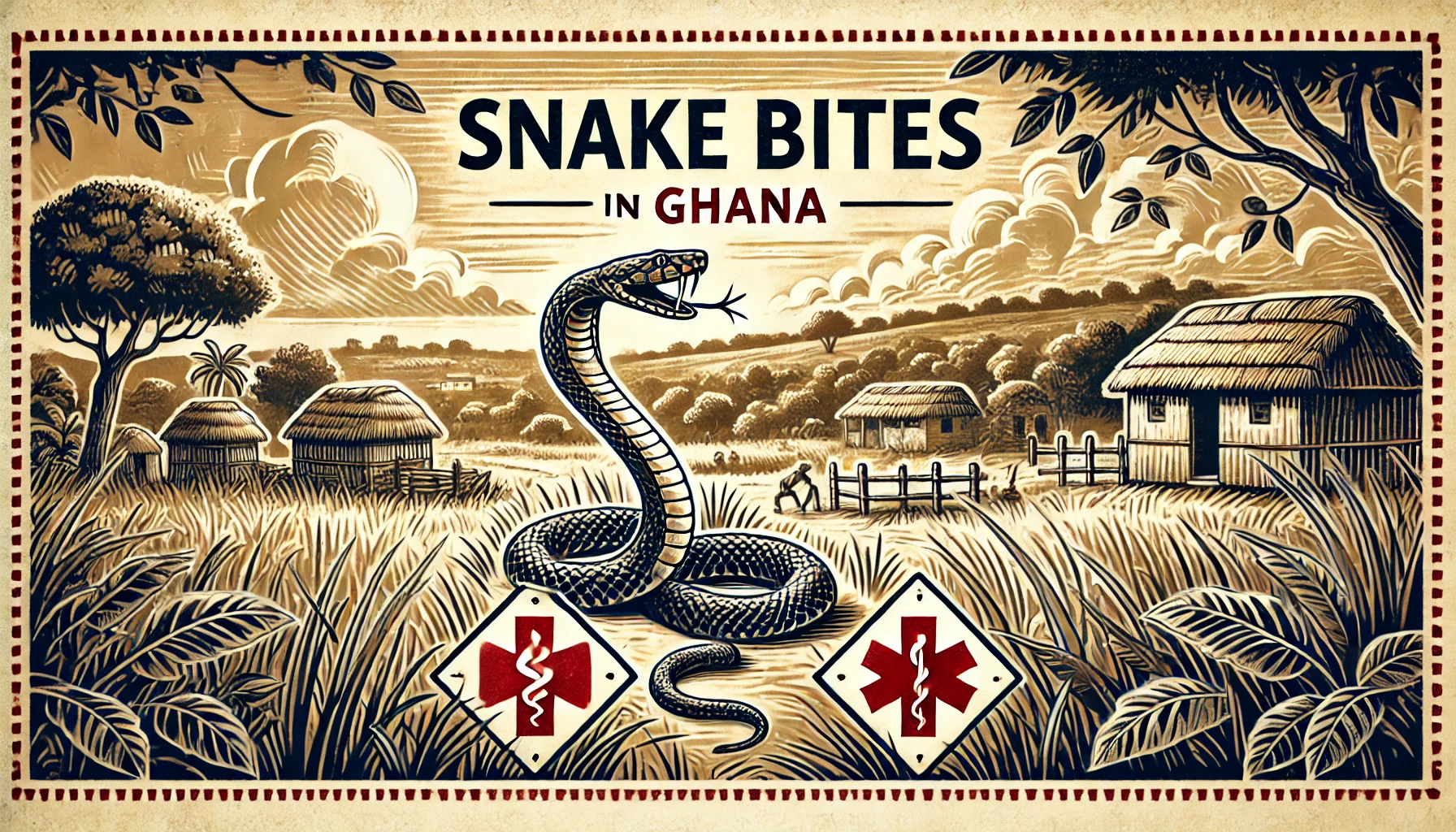
🐍🌳 Snake Bites: MUST KNOW For All Ghanaians
Below is a clear, detailed, and reader-friendly article on snake bites specifically for Ghanaians. It is divided into parts for easy reading. We will address real snake bites, their causes, signs, symptoms, treatment options, common myths in Ghana, and also briefly touch on “snake bite” piercings and related concerns (e.g., “are snake bite piercings safe,” “can snake bite kits worth it,” etc.). The aim is to educate, dispel myths, and provide guidance on proper first aid and medical care.
Images are only illustrative; may not pass an academic critique
PART 1: INTRODUCTION
Snake bites remain a major health concern in Ghana. In rural areas, they can be common due to close contact with snakes in farms, bushes, and around homes. However, misinformation, myths, and resorting to unproven traditional treatments can lead to complications—even death.
1.1 Importance of Snake Bite Awareness
- Potentially life-threatening: Certain snakes have venom that can cause organ failure, paralysis, or severe bleeding.
- Timely treatment saves lives: Quick identification and getting help from a recognized hospital can prevent severe complications.
- Myths can be dangerous: Many Ghanaians turn to traditional healers who sometimes use unproven methods or “snake bite kits” believed to “suck out venom.” These approaches may do more harm than good.
1.2 Note on “Snake Bite Piercings”
In modern times, the term “snake bite” is also used to describe a type of lip piercing (two piercings on either side of the lower lip). This has nothing to do with actual snake bites but appears frequently in questions such as:
- “Are snake bite piercings safe?”
- “Are snake bite piercings dangerous?”
- “Are snake bite piercings haram or halal?”
- “Are snake bite piercings permanent?”
- “Are snake bite piercings worth it?”
We will cover these and other “snake bite piercing” queries in Part 5. For now, the focus is on true snake bites from actual snakes.
PART 2: COMMON SNAKES IN GHANA AND THEIR VENOM
Ghana is home to various snake species. While not all are venomous, several can be life-threatening. Recognizing the dangerous ones helps you understand the need for immediate care.
Cobra (Naja nigricollis)
- Venom Type: Neurotoxic (affects nerves and can paralyze muscles), sometimes cytotoxic (causing local tissue damage).
- Effects: Can lead to difficulty breathing, drooping eyelids, blurred vision, and even respiratory failure if untreated.
Puff Adder (Bitis arietans)
- Venom Type: Cytotoxic (destroys tissue) and can affect blood clotting.
- Effects: Severe swelling, tissue damage, and bleeding disorders.
Green Mamba & Black Mamba (though rarer in certain parts of Ghana)
- Venom Type: Highly neurotoxic.
- Effects: Rapid paralysis, breathing difficulties, and can be fatal within hours if not treated.
Carpet Viper (Echis ocellatus)
- Venom Type: Hemotoxic (affects blood clotting) and can also destroy tissues.
- Effects: Severe bleeding, swelling, and possible death from hemorrhage.
Non-venomous Snakes (e.g., Python, House Snake)
- No venom, but the bite can still cause infection if not cleaned.
Images are only illustrative; may not pass an academic critique
PART 3: CAUSES, SIGNS, AND SYMPTOMS OF A SNAKE BITE
3.1 Causes
- Accidental stepping on or touching snakes while farming or walking in grassy areas.
- Sleeping on the floor in poorly protected rooms, allowing snakes to crawl in.
- Snakes in water: “Can snake bite in water?” Yes, some snakes can bite in water if they feel threatened.
3.2 Signs and Symptoms
Signs of a venomous snake bite often appear within minutes to a few hours:
Local (Around the Bite Site)
- Fang marks (sometimes just small punctures that look like a scratch).
- Swelling, redness, severe pain, or bleeding.
- Blisters or necrosis (blackening of tissue) in cytotoxic snake bites.
Systemic (Affecting the Whole Body)
- Nausea, vomiting, or dizziness.
- Difficulty breathing or swallowing (especially with neurotoxic venom like Cobra or Mamba).
- Excessive bleeding from gums, nose, or in urine (hemotoxic snake venom).
- Weakness, drooping eyelids, blurred vision, or paralysis.
How snake bite feels: Typically severe pain, but with neurotoxic snakes, the bite can sometimes be less painful at first, leading people to ignore it—very dangerous!
How snake bite looks like
- Two puncture marks (though not always visible).
- Swelling or bruising around the site.
Images are only illustrative; may not pass an academic critique
PART 4: TREATMENT AND FIRST AID
4.1 Immediate First Aid (What to Do When Snake Bites)
- Stay Calm and Reassure the victim. Fear and panic can increase heart rate, spreading venom faster.
- Immobilize the limb (e.g., splint or bandage). A broad pressure bandage can slow venom spread, but do not wrap it so tightly that it stops blood flow.
- Remove any tight items (rings, watches, bracelets) before swelling worsens.
- Get the victim to the nearest hospital with snake bite management facilities as soon as possible.
- If possible, identify the snake or remember its features—but do not waste time trying to capture or kill it.
Myth: Cutting the wound or sucking out venom with “snake bite kits” (like suction devices) is not recommended by the WHO Snake Bite Guidelines (2023). These methods can cause more harm and lead to infections.
4.2 Medical Treatment
- Antivenom: The most effective treatment. Must be administered in a hospital. Different snake venoms require different antivenoms.
- Supportive Care: May involve IV fluids, breathing support, blood transfusions, or antibiotics if an infection is suspected.
- Observation: Doctors monitor for complications like bleeding, kidney failure, or shock.
4.3 Common Complications
- Amputation or severe tissue damage around the bite site (especially from cytotoxic snakes).
- Bleeding in vital organs leading to stroke or shock.
- Respiratory failure from neurotoxic venom.
- Death if timely medical intervention is not sought.
PART 5: ADDRESSING “SNAKE BITE PIERCINGS” & OTHER FREQUENT QUERIES
In Ghana, many youths and young adults may come across “snake bite piercings,” a body art trend involving two separate piercings on the lower lip. They have nothing to do with actual snake bites but are commonly asked about together.
5.1 Are Snake Bite Piercings Safe or Dangerous?
- Safe if done correctly by a qualified professional under sterile conditions.
- However, risks include infection, swelling, gum recession, chipped teeth, and scarring.
5.2 Are Snake Bite Piercings Bad for Your Teeth?
- Yes, constant friction of the jewelry can damage tooth enamel and irritate gums.
5.3 Are Snake Bite Piercings Painful?
- Pain varies from person to person, but lip piercings are generally moderately painful. Proper aftercare helps minimize discomfort.
5.4 Are Snake Bite Piercings Permanent or Removable?
- They are not permanent if you remove the jewelry and let the holes close. However, they may leave small scars.
5.5 Are Snake Bite Piercings Worth It or Attractive?
- This is subjective—it depends on personal preference. Some find it stylish, others do not.
5.6 Are Snake Bite Piercings “Halal” or “Haram”?
- This depends on personal and religious beliefs. Consult local faith leaders for specific guidance.
5.7 Healing Process
- They can be hard to heal if aftercare is poor. It usually takes several weeks to months, during which you must keep the area clean and avoid irritating it.
Reminder: Actual snake bites are medical emergencies. “Snake bite piercings” are purely cosmetic and should not be confused with real bites.
PART 6: COMMON QUESTIONS AND MISCONCEPTIONS
Below are answers to some popular queries (including many rumors and myths) regarding real snake bites:
- “Can snake bite kill a dog, cat, cow, horse, lion, monkey, or even a human?” Yes, a venomous snake bite can kill any animal or person if the venom is potent and treatment is not given quickly.
- “Can snakes bite through jeans or boots?” Some large snakes with longer fangs (like cobras or vipers) can penetrate thin fabrics. Thick boots or snake-proof gaiters offer better protection.
- “Do snakes bite underwater?” Yes, certain aquatic or semi-aquatic snakes can bite if threatened in water.
- “Which snake bite is the most painful/kills the fastest?” Highly venomous snakes like the Black Mamba can be deadly within hours. Puff adders can cause excruciating pain. The actual outcome depends on the snake’s venom and the quantity injected.
- “What about snake bite dream meanings?” “When snake bite you in dream,” “What snake bite mean in dreams,” or “Why snake bite me in dream?” These vary widely in cultural and personal interpretation. Scientifically, a dream is just a dream; it is best not to rely on dream interpretations for real-life medical decisions.
- “Are snake bite kits effective or worth it?” Most modern medical experts (including WHO) advise against using suction kits or cutting the bite area. The best approach is to seek hospital care immediately.
- “Why snake bite tomato?” / “Can snake bite tomato?” It is highly unlikely a snake targets tomatoes. Such tales could be myths or mistaken sightings.
- “Can a snake bite kill instantly or on the spot?” Although a snake bite can lead to rapid deterioration (especially with a high venom dose), actual immediate death is rare. However, neurotoxic snakes can kill within a few hours if untreated.
- “Is there any snake bite with no antivenom or no cure?” While rare, there are snakes with limited or no commercially available antivenom. In Ghana, most common venomous snake bites can be treated with available antivenoms in well-equipped hospitals.
- “What about bandaging snake bites? Using a pressure immobilization technique is recommended but do not block blood supply with an overly tight tourniquet. “Why bandage snake bite?” – to slow venom spread.
PART 7: MYTHS AND MISCONCEPTIONS IN GHANA
- Myth: “Herbal potions alone can cure snake bites.” Fact: Herbal remedies have not been proven to neutralize venom. Delaying hospital treatment can cause complications.
- Myth: “If there is no swelling, the bite is not venomous.” Fact: Some neurotoxic bites (e.g., mamba) may not cause immediate swelling but are still lethal.
- Myth: “Sucking out venom” is effective. Fact: Sucking venom can damage tissues and increase infection risk. Modern guidelines advise against this.
- Myth: “If you dream about snake bites, you must see a traditional healer.” Fact: Dreams are not reliable medical predictors. Focus on real prevention measures and use healthcare services if an actual snake bite occurs.
PART 8: SAFETY, PREVENTION, AND FINAL ADVICE
- Avoid Snake-Prone Areas: Especially at night, or wear protective gear like boots and thick clothing if you must go.
- Keep Your Surroundings Clean: Remove debris, tall grass, or garbage around your home to reduce rodent populations that attract snakes.
- Educate Children: Teach kids to avoid playing in bushes or near water bodies without adult supervision.
- Don’t Handle Snakes: Even non-venomous ones can bite. Leave snake removal to professionals.
- Stay Up-to-date: Follow official guidelines like WHO Snake Bite Management Guidelines and seek modern medical care if bitten.
CONCLUSION
Snake bites in Ghana pose a serious threat, but with correct information and timely medical treatment, most can be survived without lasting damage. Always prioritize hospital care over unproven traditional methods or so-called “snake bite kits.” Stay informed and spread awareness in your community—this can save lives.
Remember: While “snake bite piercings” are a separate cosmetic matter and popular in fashion, they have absolutely nothing to do with true snake bite injuries. If you decide to get such piercings, do it hygienically and be aware of risks to your teeth and gums.
Stay safe, stay aware, and seek proper healthcare for any real snake bite!
Images are only illustrative; may not pass an academic critique
- First Aid for Ghanaians: Essential Knowledge for Common Emergencies 🩹💊🚑
- Battling the Unseen: The Truth About Neglected Tropical Diseases 🧟♂️
- Rickettsial Diseases, Rabies, Leptospirosis, Leishmaniasis, Chikungunya, Zika, And Dengue Fever 🌡️😷
- Health Insurance Policies in Ghana for the Ordinary Ghanaian: A Complete Guide 🏥💊🛡️
- Self-Medication and Its Dangers in Ghana ⚠️💊💉

We Love to Educate for Free
But please do not self-medicate as wrong doses of even correct medications can cause serious complications like kidney failure and even death. You can talk to a LICENSED health professional (including medical doctors, specialists, physician assistants, clinical psychologists, nutritionists/dieticians, medical herbalists, etc) by downloading the Deluxe Hospital app here:










